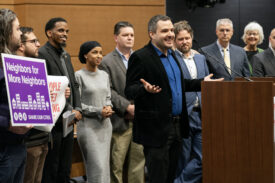Editor’s note: This is by Gordon Price, former city councillor for Vancouver, BC, Director of the City Program for Simon Fraser University, and Sightline board member.
In my 15 years on City Council in Vancouver, I read a lot of reports. Ninety percent of them were not exactly stimulating: lane pavings, grant approvals, appointment of the external auditor … all the things that keep a city going. Occasionally, a report would appear that grabbed your attention—and on a very rare occasion, would actually change your understanding of the world, or at least your city.
I’d like to say that such a report recently appeared on the agenda of the City of Vancouver. But it didn’t. It appeared in Burnaby—the municipality just to the east. And what a subject: "Global Peak in Oil Production: the Municipal Context."
For those interested in the subject, there’s not a lot that’s new in the report; it’s primarily a background piece. Even on those terms, it makes informative reading. What makes it significant, however, is that it was requested by politicians, prepared by staff and comes with the seal of government—as far as I know, the first such report of its kind in Canada.
It’s not as dry as you might guess, what with some amusing quotes at the head of each section – "Today no one disagrees that the wolf is out there but differences in analyses and opinions as to when it will attack the sheep still prevail." It provides a Canadian perspective, and, after noting that "It is too late to panic. It is time to plan," it provides an appendix of actions that the municipality might take.
Will action follow? I haven’t heard the results of the debate, but the mere fact that a government body is opening the door to a subject that most leaders would prefer remain firmly shut off is a tangible action all on its own.







